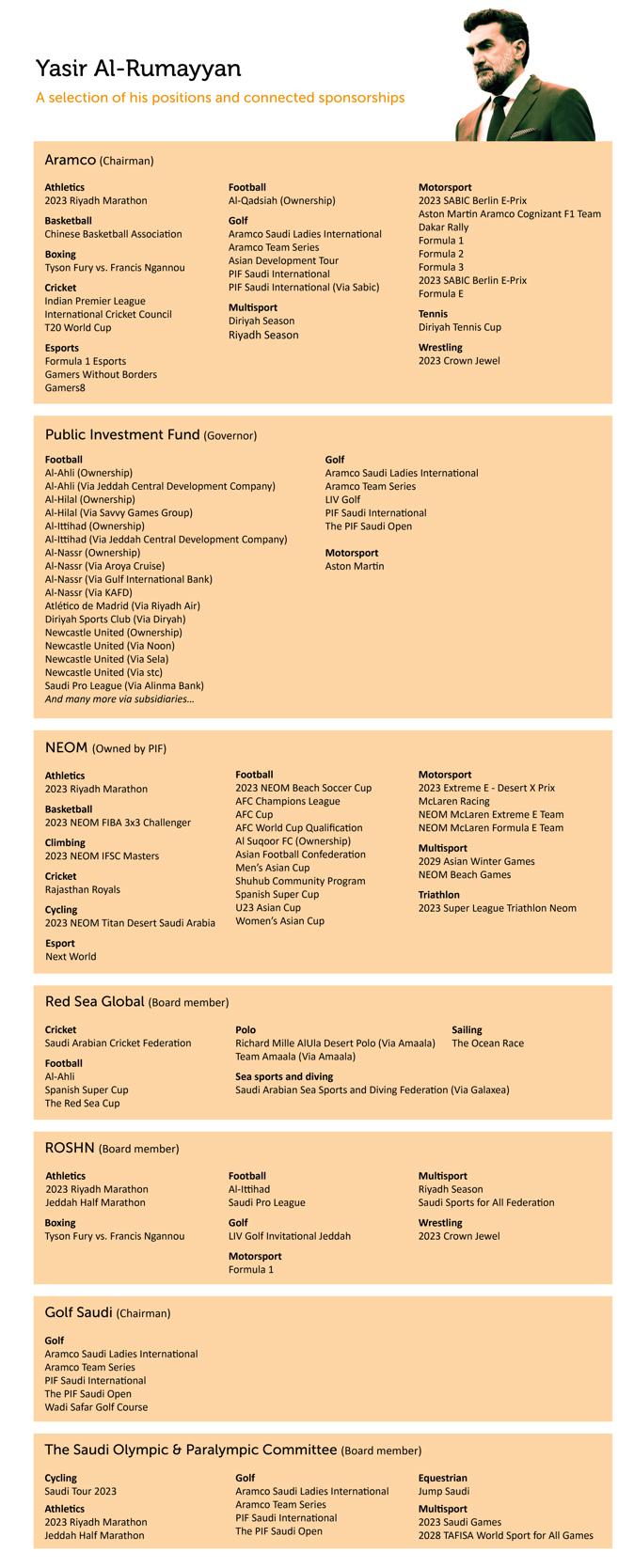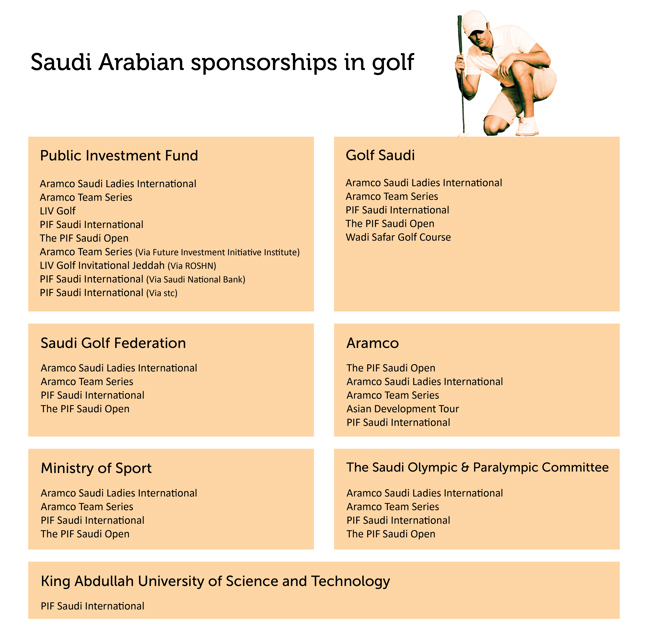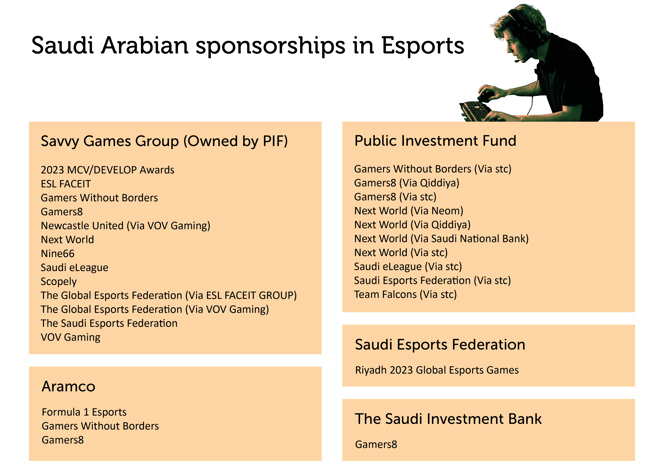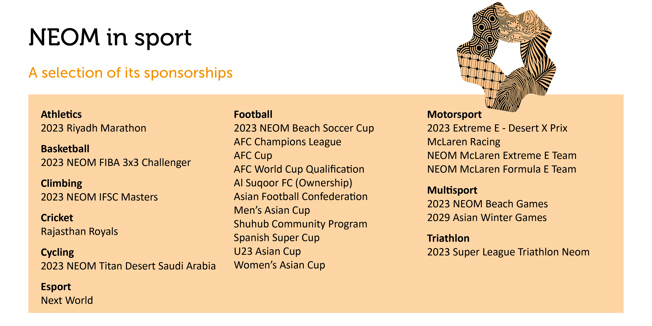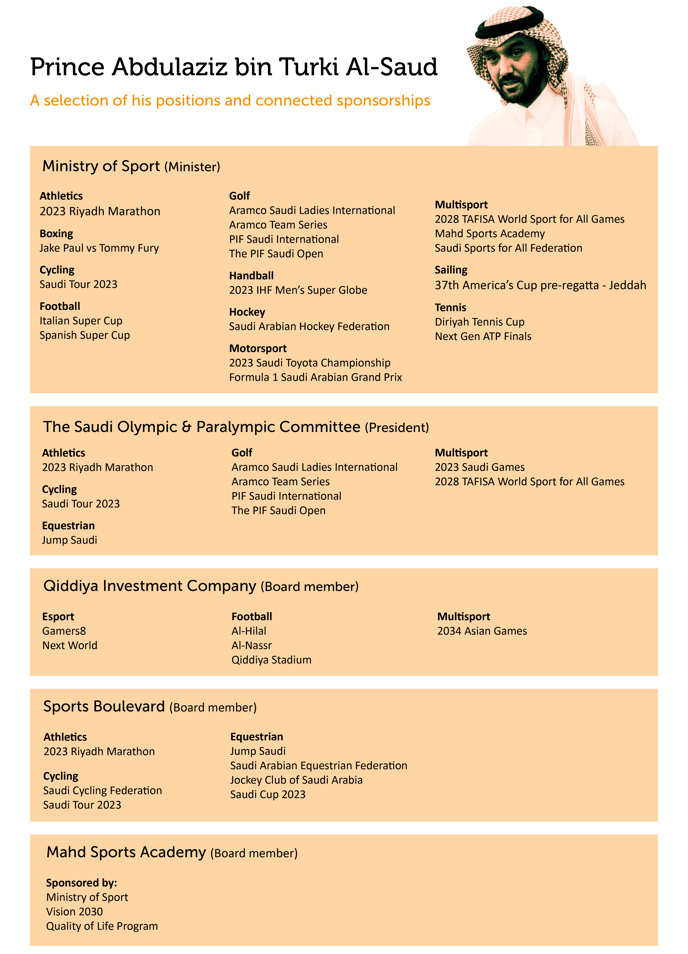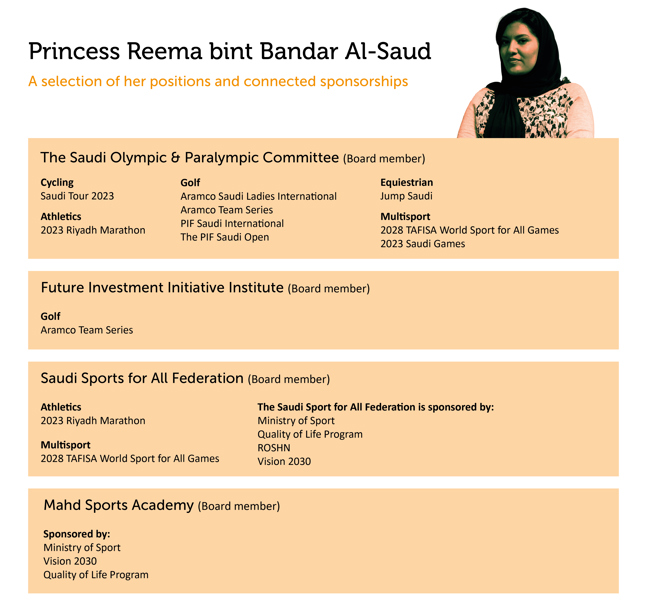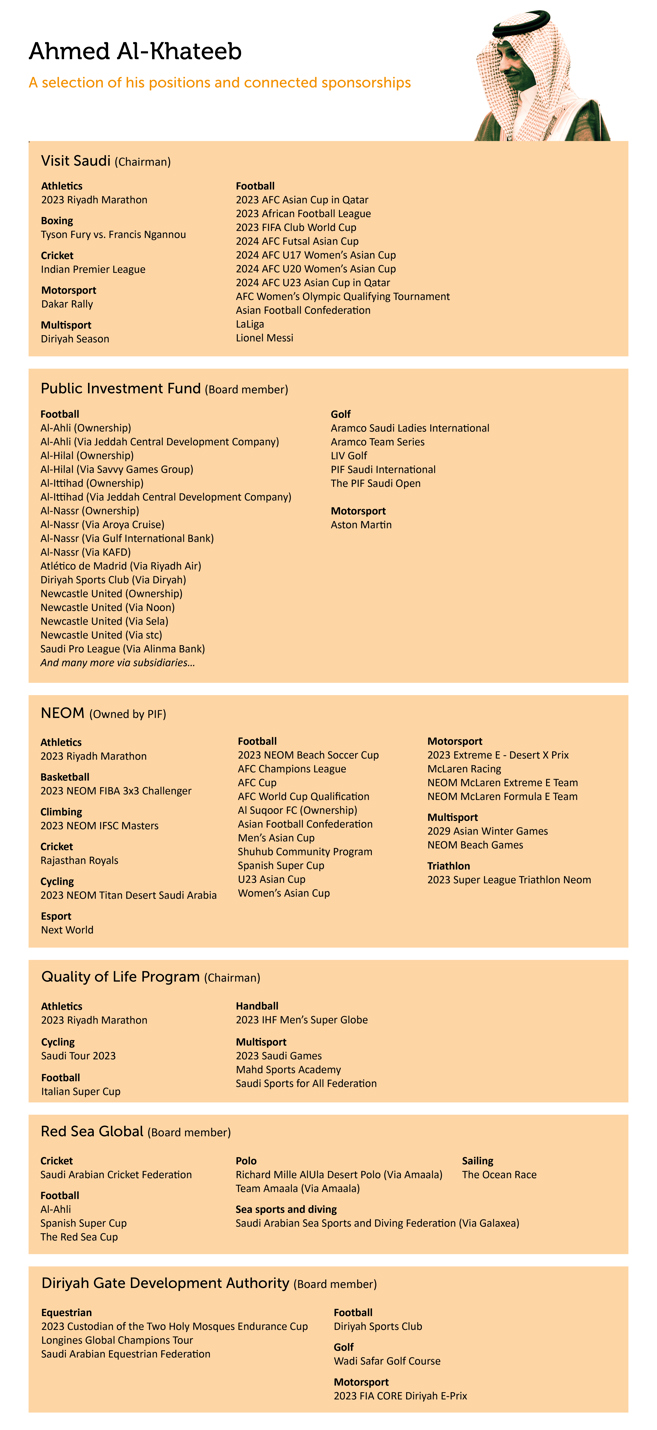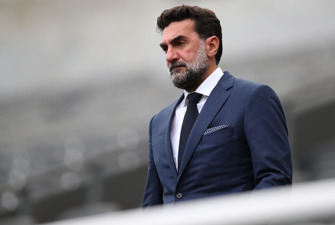The power players behind Saudi Arabia's sports strategy
Exclusive research by Play the Game maps the inner circle behind Saudi Arabia's sports endeavour and unveils more than 300 Saudi sponsorships in sport. The research sheds light on a myriad of conflicts of interest and threats to the integrity of sports.
Research by: Nathalie Zahle, Christian Le Coq, and Stanis Elsborg
Watch Stanis Elsborg's presentation of the research at Play the Game 2024 or read the analysis below
In an intriguing fusion of power, politics, and sport, a select group of individuals has come to the forefront of Saudi Arabia’s ambitious venture into the global sports arena. This cast includes a prince, a princess, a globetrotting Harvard-educated businessman, and a minister deeply involved in the military industry.
Together they form the influential inner circle behind the Kingdom’s sports initiatives and investments, all under the watchful eye of Mohammed bin Salman, the crown prince and prime minister of Saudi Arabia.
While much has been said about the Saudi Arabian regime and Mohammed bin Salman’s investments and engagement in world sports, less is known about the next layer of individuals who play a vital role in enhancing Saudi Arabia’s influence in international sports.
New research by Play the Game sheds light on these key figures behind the Kingdom’s ambitions in sport. It maps 795 positions in 156 Saudi entities and more than 300 Saudi sponsorships in sport, exposing significant conflicts of interest involving influential Saudi statesmen, and not least a troubling relationship between the sporting and political spheres in Saudi Arabia.
The research project consists of a comprehensive dataset, and this article offers only a glimpse into the extensive web and labyrinth of the network that surrounds the state-run Saudi sports venture, which poses substantial threats to the integrity of sport and sport’s self-proclaimed devotion to democracy, transparency, freedom of expression and athletes’ rights.
Saudia Arabia’s sports strategy became visible in the summer of 2023
Saudi Arabia has poured vast riches into the sports world for years, but it was in the summer of 2023 that the Middle East powerhouse truly captured most of the world’s attention. A significant influx of some of the highest-paid football players into the domestic Saudi Pro League (SPL) sent shockwaves through the sporting world. Cristiano Ronaldo set the stage with his move from Manchester United to Al-Nassr in January 2023. In the same year’s summer transfer window, Ronaldo was joined by many other football players, including Karim Benzema, the French winner of the 2022 Ballon d’Or, and the Brazilian star Neymar.
Brazilian football star Neymar (L) and Al-Hilal's president Fahad bin Nafel (R) pose for a photo with an Al-Hilal jersey as Neymar joins the Saudi state-owned club under a lucrative two-year contract, purportedly earning the Brazilian a staggering sum of around 300 million US dollars per year. Notably, the jersey wears the logo of Savvy Games Group, a Saudi state-owned entity and sponsor of Al-Hilal. Photo: Anadolu Agency / Getty Images
These high-profile transfers were made possible by Mohammed bin Salman’s launch of the so-called ‘Sports Clubs Investments and Privatisation Project’. Under this initiative, Saudi Arabia’s sovereign wealth fund, the Public Investment Fund (PIF), took ownership of four SPL clubs – Al-Ahli, Al-Ittihad, Al-Hilal, and Al-Nassr, and through that manoeuvre, the clubs got financial backing from a sovereign wealth fund with assets of nearly 800 billion US dollars.
Simultaneously, four other clubs transitioned into the hands of state-owned entities like the Kingdom’s oil giant, Aramco, the Royal Commission for Al-Ula, Diriyah Gate Development Authority, and NEOM, a futuristic 500-billion-dollar mega-city under construction in the northwest of Saudi Arabia.
This unparalleled financial support has enabled these clubs to offer football players staggering salaries and has presented the world of football with substantial transfer fees. According to a recent study conducted by Deloitte, SPL clubs had a net expenditure of 907 million US dollars in the summer of 2023, ranking second only to the English Premier League, which recorded a net expenditure of 1.39 billion US dollars for acquiring new players.
However, this is just one facet of a comprehensive sports strategy initiated in tandem with ‘Vision 2030’, the Kingdom’s national development plan launched by Mohammed bin Salman in 2016. ‘Vision 2030’ represents a comprehensive reform process of the Kingdom’s economic, political, and social structures. Since then, Saudi Arabia has played host to numerous international sporting events and poured substantial resources into the sports sector. Their objective is not only to establish themselves as the Middle Eastern sports hub but also to become a major player on the global sports and geopolitical stage.
At the heart of this strategy is a cadre of influential individuals serving the interests of the State of Saudi Arabia.
Yasir Al-Rumayyan: The jack of all trades
Yasir Al-Rumayyan, a Saudi businessman and graduate of the Harvard Business School, has emerged as a central figure in this intricate landscape. Al-Rumayyan is considered to be amongst the most influential people globally due to his roles as governor of PIF, one of the world’s largest sovereign wealth funds, and chairman of Aramco. PIF is not only the driving force behind ‘Vision 2030’ but also the primary financier of the regime’s many sporting investments.
Yasir Al-Rumayyan plays a vital role in Saudi Arabia’s sports strategy, holding numerous key positions central to the realisation of its ambitions in world sport and geopolitics. Photo: Matthew Lewis / Getty Images
Al-Rumayyan’s ascent into these pivotal roles began with a call from MBS, as Crown Prince Mohammed bin Salman is often called.
In a 2020 interview with Bloomberg, Al-Rumayyan recalled the moment when MBS made the call: “Here’s what I want you to do … When can you start?” To which Al-Rumayyan replied “I need like three months.” However, the Crown Prince was resolute: “No, it’s one month, and you will do it.” The next week, Al-Rumayyan received another call from MBS: “You have to come immediately.”
Since that call, Al-Rumayyan has evolved into a linchpin figure for Mohammed bin Salman. Al-Rumayyan’s work portfolio is a dizzying tapestry that spans from chairing the world’s third-largest company, Aramco, and being on the board of directors of PIF to presiding over the country’s golf federation and Newcastle United.
Notably, he also recently assumed the role as chairman of the newly established state-owned national airline, Riyadh Air, which has already made headlines in the world of sports as the new main sponsor of the renowned Spanish football club Atlético de Madrid. Remarkably, the airline has yet to grace the skies with its maiden flight scheduled for 2025.
H.E. Yasir Al-Rumayyan, the Governor of #PIF and Chairman of #Riyadh Air, arrives at our chalet at the #ParisAirShow, welcomed by CEO Tony Douglas and the executive leadership team.@PIF_en pic.twitter.com/jnl2Zp5mtW
— Riyadh Air (@RiyadhAir) June 21, 2023
However, his influence reaches far beyond financial matters. It extends to reputation management where Al-Rumayyan uses sport and related media appearances in an attempt to reshape the regime’s reputation for being a pervasive human rights violator associated with the brutal killing of journalist Jamal Khashoggi in 2018, the execution of 81 people in a single day in 2022, the imprisonment of women’s rights activists, and for killing hundreds of unarmed Ethiopian migrants at the Yemen-Saudi border as reported by Human Rights Watch in September 2023.
Al-Rumayyan also embodies the delicate dance of diplomacy on behalf of the Kingdom, epitomised by his golf outings with former president Donald Trump at a side-event as part of the breakaway golf tournament LIV Golf, financed by PIF. Sport offers a unique arena to operate under the normal political spotlight and serves as a means to foster new diplomatic relations, negotiate trade agreements, entice tourism, and establish valuable connections within the global political landscape.
Former president Donald Trump and Yasir Al-Rumayyan, governor of the Public Investment Fund (PIF), the sovereign wealth fund of the Kingdom of Saudi Arabia, at the 1st tee prior to the start of the second round of LIV golf invitational series on July 30, 2022, in Bedminster, New Jersey. Photo: Icon Sportswire / Getty Images
A web of conflicts of interests
The plot thickens as we delve deeper into Al-Rumayyan’s extensive involvement in golf where a complex web of conflict of interests comes to light.
His multiple key positions within entities such as Aramco, where he commands the chairman’s seat; PIF, where he holds a prominent board position; both the Saudi Arabian Golf Federation and the Arab Golf Federation, under his presidency; Golf Saudi, where he reigns as chairman of the board; and the Saudi Olympic and Paralympic Committee, where he is a board member, raise concerns. Remarkably, all these entities, in one form or another, serve as sponsors or partners of the same events: The Aramco Team Series, a five events series held in five different countries over the world, and the Aramco Saudi Ladies International held in Jeddah, Saudi Arabia. Both events have prize funds of 5 million US dollars and are sanctioned tournaments on the Ladies European Tour.
The question that looms large is the extent to which these affiliations and positions may influence or interconnect with one another. Which interests are Al-Rumayyan in fact serving? Saudi Arabia’s engagement in the world of golf is indeed a state-driven project, as exemplified in the below graphic.
Saudi state-owned companies and initiatives are highly involved in the world of golf as sponsors and partners. Here’s a picture from the Aramco Team Series event in London in 2022. Photo: Tom Dulat / Getty Images
Newcastle United's many Saudi Arabian sponsorships
Let us consider another example. In 2021, PIF orchestrated a takeover of Newcastle United and installed Al-Rumayyan into the chairman’s seat of the English Premier League football club. In the wake of this takeover, Newcastle has made several sponsorship deals with companies tied to the state of Saudi Arabia.
In 2022, Newcastle announced a record-breaking deal with Noon, an e-commerce platform in the Arab world founded in 2016 by none other than PIF and Emirati entrepreneur Mohamed Alabbar, as the club's official shirt sleeve sponsor.
In 2023, Newcastle United ventured into a multi-year shirt sponsorship deal with Sela, an event and experiences organisation owned by PIF. Further obfuscating the already murky waters of conflict of interests, the state-owned flag carrier, SAUDIA, and the PIF-owned company, Saudi Telecom Company, assumed the role of Newcastle's official tour partner for the club’s Saudi Arabia tour in January 2023. Then, in October 2023, SAUDIA was officially announced as the club’s official airline partner.
To compound this ever-expanding labyrinth of conflicts, Savvy Games Group, another PIF-owned company, actively participates in Newcastle’s esports section through a sponsorship from its subsidiary company, VOV Gaming. Savvy Games Group is central in the Kingdom’s plan to make it the global hub for the gaming and esports sector by 2030.
Delving deeper into the football scene, Al-Rumayyan’s pivotal position on the board of PIF highlights other concerns. As already mentioned, PIF currently holds ownership of four clubs within the Saudi Pro League as well as Newcastle United. Additionally, Aramco, where Al-Rumayyan is chairman, owns another Saudi club, Al-Qadsiah.
According to Transfermarkt, data indicates that five out of the 20 transfer deals that brought players to Al-Qadsiah originated from the PIF-owned Saudi clubs. Furthermore, Newcastle itself sold Allan Saint-Maximin to the PIF-owned club, Al-Ahli.
These structures of multi-club ownership pose a threat to the market mechanisms of the international transfer market, where players are bought and sold based on their market value. When both the buying and selling clubs are owned by the same investor, it can lead to questions about transparency and whether the transfer fee paid for the player really reflects the player’s actual value or may have been artificially boosted.
Moreover, when it is de facto the state of Saudi Arabia, that owns eight domestic league clubs, it could raise concerns about match-fixing. The football clubs in the Saudi Pro League not only compete for the domestic league title but also to play in the region’s prestigious AFC Champions League, which by the way is sponsored by NEOM, a Saudi state-run and PIF-backed initiative, as a part of its global partnership with the Asian Football Association.
This situation potentially threatens the integrity of sport in terms of match-fixing as it opens a potential for the Saudi Arabian state to make choices about preferred results in matches between the state-owned clubs.
The Prince of Saudi sport
Now, let’s move on to the person who pulls the strings in the Saudi Ministry of Sport: His Royal Highness Prince Abdulaziz bin Turki Al-Saud. The former Saudi racing driver, businessman, and member of the House of Saud was appointed as minister of sport by royal decree on 25 February 2020.
Saudi Arabia’s minister of sport, Prince Abdulaziz bin Turki Al-Saud. Photo: Anadolu Agency / Getty Images
Yet, his influence doesn’t end there. In tandem with his capacity as minister of sport, he is also president of the Saudi Olympic and Paralympic Committee, which firmly anchors him at the epicentre of Saudi Arabia’s multifaceted sporting pursuits.
The web of Prince Abdulaziz's involvements sprawls even further, showcasing a remarkable portfolio of affiliations, duties, and responsibilities.
- Minister of sport
- President of the Saudi Olympic & Paralympic Committee
- Vice president of the Olympic Council of Asia
- President of the Union of Arab National Olympic Committees (2021-2024)
- President of the Union of Arab Football Federation
- President of the Islamic Solidarity Sports Federation
- Deputy chairman of the board of the Equestrian Authority
- Board member of the Events Investment Fund
- Chairman of the board of the Mahd Sports Academy
- President of the Saudi Games
- Board member of the Qiddiya Investment Company
- Board member of the of Sports Boulevard.
Blurring the lines between government and sport
However, this type of formal relationship between a leader of a National Olympic Committee and a national government raises critical questions about conflicts of interest, questions of allegiance, and the so-called autonomy of sport that the Olympic movement so ardently promotes.
On 31 October 2014, members of the United Nations General Assembly acknowledged the autonomy and independence of sports by adopting the resolution ‘Sport for development and peace’. Thomas Bach, president of the IOC, hailed this resolution as a “historic milestone in the relations between sport and politics”.
Thomas Bach underlined the importance of the resolution and the autonomy of sport stating that “We must form partnerships with political organisations based on this recognition of the autonomy of sport. The excellent relations between the UN and the IOC can in this respect serve as an example for relations on the national level between national Olympic committees and national governments. This relationship with governments requires that sport always remains politically neutral.”
A year later, at Play the Game’s conference in Aarhus, Denmark, the then Ethics and Compliance Officer of the IOC, Pâquerette Girard Zappelli, reaffirmed the IOC’s unwavering stance on the autonomy of sports. She made it unequivocally clear that governmental interference in the affairs of NOCs “must not be”.
Zappelli’s statement aligns with Rule 27 of the Olympic Charter, which delineates the mission and role of the NOCs. While Rule 27 permits cooperation between governmental institutions and NOCs, it mandates that NOCs tenaciously resist external political and economic pressures.
And on 22 May 2023, the Olympic movement got the backing for the autonomy of sport by the G7 leaders: G7 are “fully respecting the autonomy of sporting organisations”.
However, the IOC seems to take its own rules lightly when dealing with authoritarian states, as demonstrated in a survey by Play the Game from 2017, which showed that one in seven National Olympic Committees was politically dependent on its government.
That could explain why it is possible for a Saudi minister of sport, a government representative, to simultaneously lead the Kingdom’s NOC and take other positions in Olympic sport like being the vice president of the Olympic Council of Asia.
However, it raises many questions about the role of Prince Abdulaziz bin Turki Al-Saud. Will he be willing and able to effectively uphold the autonomy of the NOC as a minister and government representative if a situation arises, where the interests of the government and the interest of the Olympic movement diverge politically?
The Princess, diplomat, and sports leader
Another Saudi government official working in the corridors of international sport is Princess Reema bint Bandar Al-Saud, a member of the House of Saud. She is the Saudi Arabian ambassador to the United States, where she took office on 23 February 2019, becoming the first female ambassador in the country’s history.
Princess Reema bint Bandar Al-Saud. Photo: Brad Barket / Getty Images
In the realm of politics and sport, she is following in the footsteps of two of her siblings. Her brother, Khalid bin Bandar bin Sultan Al-Saud, serves as the Saudi Arabian ambassador to the United Kingdom, while also presiding over the Saudi Arabian Shooting Federation.
Meanwhile, another brother, Faisal bin Bandar bin Sultan Al-Saud, holds the role of chairman of the Saudi Esports Federation, vice president of the Global Esports Federation, global vice president of the International Esports Federation, and board member of the Royal Commission for Riyadh City, which serves as a unified command for development of the city of Riyadh.
Princess Reema has carved a distinct niche for herself in the sports hierarchy of Saudi Arabia. Beyond the role as ambassador, Princess Reema also serves as a board member of the Saudi Olympic & Paralympic Committee and the Saudi Sports for All Federation, the main body responsible for developing community sports in Saudi Arabia. Furthermore, she contributes to the ambitious national sports academy, Mahd Sports Academy, where she, as a board member, enjoys the company of the Saudi sports minister as well as renowned football coach Jose Mourinho.
But it is her top position as a member of the International Olympic Committee (IOC) that opens doors for Saudi Arabia in world sport. As a member of the IOC, the supreme authority of the Olympic Movement, Princess Reema is centrally placed in the governing of sports. At the IOC, she also operates in three commissions: Gender Equality, Diversity and Inclusion (2022-), Sustainability and Legacy (2022-), and Coordination for the Games of the XXXV Olympiad Brisbane 2032 (2021-).
Princess Reema’s roles give her the opportunity to serve the diplomatic, political and sporting interests of the State of Saudi Arabia, all at the same time. In a country where women’s rights are limited compared to men’s, she also serves as a symbol of female empowerment and as a key player in the Kingdom’s global engagement, both in diplomacy and the world of sports.
The minister of tourism: A tangle of interests in the sporting realm
Tourism and cultural activities, including sports, play an important part in the realisation of Saudi Arabia's transformative 'Vision 2030'. As such, Ahmed Al-Khateeb, the Saudi minister of tourism, is a central figure deeply entrenched in the country’s strategic approach to sports.
Minister of tourism, Ahmed Al-Khateeb (R), engages different government entities in world sport. Photo: Anadolu Agency / Getty Images
Sports, with its unique emotional allure, stands out as a potent force attracting many tourists and also has the ability to elicit euphoria and an imagined community among people. Cultural attractions and sporting and entertainment activities also serve as means to address the aspirations and entertainment desires of the Saudi population and offer alternative sources of diversion and national pride in the absence of political rights and civil liberties.
This is like an echo from the Roman Empire, where emperors, under the guise of pseudo-democratic displays, captivated the masses at the horse racing track and the gladiatorial arena in Rome. Here, the emperors sought to buy and secure the loyalty of the people through different kinds of entertainment.
One of the key places where the minister of tourism, Ahmed Al-Khateeb, wields influence is ‘Visit Saudi’, a tourism bureau powered by the Saudi Tourism Authority, chaired by Al-Khateeb himself.
In February 2023, FIFA announced that the men’s 2023 FIFA Club World Cup will be held in Saudi Arabia, and in June 2023 Jeddah was confirmed as host city with ‘Visit Saudi’ as the tournament’s partner. Fast forward to October 2023, and ‘Visit Saudi’ was once again in the spotlight when it was announced that it would be the main sponsor of the Inaugural African Football League, a tournament hosted by the Confederation of African Football (CAF).
This partnership further solidified the relationship between CAF and Saudi Arabia. In May 2023, CAF and the Saudi Arabian Football Federation had already signed a five-year memorandum of understanding with the mutual objective to foster "growth opportunities for African and Saudi football". According to investigative journalist Philippe Auclair, Saudi Arabia is strategically and discreetly employing these memorandums of understanding with various football associations as building blocks to secure the necessary votes for hosting the 2034 FIFA World Cup. On October 31, 2023, FIFA announced that Saudi Arabia is the sole bidder for the event so it appears that the world’s biggest football event will once again return to the Middle East and take place 12 years after the much-debated 2022 World Cup in Qatar.
Avid football enthusiasts might also remember 'Visit Saudi' from earlier when it announced Argentinian superstar Lionel Messi as its ambassador in 2022. The minister of tourism seized the opportunity to promote the partnership with Messi through his Twitter account.
I am happy to welcome our Tourism Ambassador and star Lionel Messi and his family and friends this month on his second visit to Saudi to enjoy our most beautiful tourism destinations, connect with our people and enjoy unique experiences! @VisitSaudi pic.twitter.com/GCpX6JLAVu
— Ahmed Al Khateeb أحمد الخطيب (@AhmedAlKhateeb) March 8, 2023
In a piece for The New York Times, investigative journalists Karim Zidan and Tariq Panja later unveiled intriguing details about the Messi partnership. According to their reporting, Messi stood to receive a staggering sum of 25 million US dollars over three years for a symbolic amount of work: “A few commercial appearances, a handful of social media posts and some all-expenses-paid vacations to the Kingdom with his family and children. He is expected to share images of those trips — marked with a Saudi-approved hashtag — with his vast online following.”
Saudi: where authentic Arabian culture, unforgettable adventures, and natural beauty await. 💫
— Visit Saudi (@VisitSaudi) November 8, 2022
Visit today and follow in the footsteps of Messi.
Discover another side of yourself in Arabia 👉 https://t.co/fTBIn98D6R#VisitSaudi #DiscoverArabia pic.twitter.com/vUs8Fz42MV
However, hidden within the contract lies a condition of significant importance to Saudi officials and a grave concern for world sport in terms of athletes’ rights and freedom of expression: Messi was prohibited from making any statements that might ‘tarnish’ Saudi Arabia’s image, a nation that has a severe human rights record.
The condition imposed on Messi draws a parallel to the PGA Tour’s framework agreement with Saudi Arabia’s Public Investment Fund, where a non-disparagement clause came under scrutiny during a hearing held by the U.S. Senate Permanent Subcommittee on Investigations on July 11, 2023. As journalist Karim Zidan rightfully points out, the clause “could be interpreted as an attempt to prevent the PGA Tour, and its players by extension, from saying anything critical of Saudi Arabia.”
The limitation of athletes’ freedom of expression is not a new issue – it has almost been a trademark for the world of sport. However, as Saudi Arabia consistently ranks among the worst countries in terms of free speech, and as its influence and investments in sport grow, it is likely that we will see more examples of contracts with these types of clauses. That would be a significant setback in the ongoing battle for athletes’ rights to speak out on crucial societal matters.
Visit Saudi is also a sponsor of the Dakar Rally, the Indian Premier League, and recently engaged in a partnership with La Liga, the men’s top professional football division of the Spanish football league system. Saudi Arabia already hosts the Spanish Super Cup until 2029, with a price tag of 34 million US dollars a year and with the Saudi Ministry of Sport, NEOM, and Red Sea Global as partners. Al-Khateeb is a board member of the latter two and he also sits on the board of PIF.
Beyond these ties, Ahmed Al-Khateeb occupies positions on the board of directors at several highly active state-owned or state-controlled Saudi companies and initiatives entrenched in the world of sports, just as he is chairman of the board of directors of the Saudi Arabian Military Industries (SAMI), member of the board of directors of the Saudi Council of Economic and Development Affairs, and member of the board of directors of the General Authority for Military Industries.
The examples outlined in this article represent just a fraction of the myriad of connections within the multifaceted network of Saudi government officials, state-owned entities and companies that sponsor sports, and the covert involvement of high-ranking Saudi government representatives in decision-making sports bodies. It underscores the severity of the issue at hand – an intricate and complex web of affiliations and conflicts of interests within the sports world, where the realms of sports, business, and politics become increasingly entwined, underlining the pressing need for governance, transparency, and accountability in world sport.
It is unlikely that the international sports organisations have the strength and will to enforce the governance and transparency that is needed to tackle the challenges that the Saudi venture in sport poses, such as preventing people from simultaneously holding multiple positions in state-owned entities engaged in various forms of sports ownerships and occupy diverse leading roles in sports organisations.
Top photo: Getty Images
Dive into the dataset and explore the web and labyrinth of Saudi Arabia’s sports strategy
If you believe we are missing something important or have spotted any errors in the dataset, please contact us at info@playthegame.org.
How we collected the data
Our dataset offers an extensive and exclusive glimpse into the scale and network of Saudi Arabia’s sports strategy and the inner circle behind it. It maps 795 positions in 156 Saudi entities and more than 300 Saudi sponsorships in sport.
The data collection took place between August and October 2023. The focus was to map Saudi Arabian sponsorships and positions for the year 2023.
The data collection was conducted by Play the Game analysts Nathalie Zahle, Christian Le Coq, and Stanis Elsborg.
Positions
Our data collection approach was exploratory and investigative in nature. We thoroughly researched the positions of Saudi Arabian ministers, the Saudi Arabian Olympic federations, Saudi Pro League football clubs, and what we deemed to be central state-owned or state-run companies and initiatives. We have focused on positions in the organisations’ decision-making bodies, and whenever possible we noted positions at the presidential, board, and executive management levels.
In addition, we compiled a list of all Saudi Arabian board level positions within the international Olympic sports federations and the Olympic Council of Asia.
Furthermore, we cross-referenced our data with a list of Saudi Arabian ambassadors, including only those diplomatic positions relevant to our project.
Sponsors
In order to create a comprehensive overview of Saudi Arabian sponsors in the world of sports, we conducted a review of the official websites belonging to the entities identified while mapping the positions. We used Google searches and news articles to supplement our findings.
Reflections
While our dataset is comprehensive, it may not cover all significant positions and sponsorships, and there might be some that we have overlooked.
Furthermore, our dataset does not encompass other crucial roles these individuals may hold within international organisations as we have focused on relational networks of people within Saudi Arabian entities. However, in articles related to the project, we may have included such information in specific instances.
